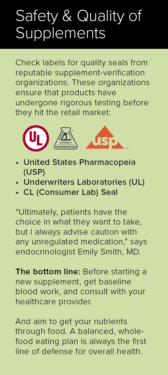Can you overdo the supplements?
America’s dietary supplement industry is big business, with an estimated 85,000 products in the marketplace. But believe it or not, most people don’t need them.
“For most healthy individuals, supplements are not a necessity,” says Emily Smith, MD, a Chicago-based endocrinologist and obesity medicine physician at Form Health, an online program that helps people reach their health and weight goals.
People who turn to dietary supplements as added nutrition insurance risk over-consuming certain nutrients. “Instead of finding supplements to address nutrient deficiencies or insufficiencies, I instead focus on the quality of the diet,” Smith says. Balancing meals and snacks with whole vegetables and fruits, as well as high-quality proteins, complex carbohydrates, and healthy fats puts people on the path to adequate nutrients. “It’s essential to minimize the intake of calorie-dense, nutrient-poor, ultra-processed foods, such as ‘junk food,’ candies, and sweets,” Smith says.
“I always tell my patients that too much of anything can be detrimental.”
But there are some who could benefit from supplements, according to Pedro Leon, a clinical dietitian in cardiovascular rehabilitation at Northwest Community Healthcare, part of NorthShore University HealthSystem, in Arlington Heights. “Supplement requirements depend on an individual’s nutritional needs and health status. The core supplements that cover a spectrum of health improvements are vitamin D, the nutrient CoQ10, fish oil, and probiotics.”
The key: knowing the proper dosage and how often to take your supplements.
Vitamins that remain in the body’s fat, instead of dissolving in water and passing out of the body through urine, pose a risk for over-consumption.

Unlike the water-soluble B-vitamins and vitamin C, fat-soluble vitamins accumulate in the body’s tissues. When taken at high doses, they can cause more harm than good.
Additionally, some vitamins might interact with medications.
“Although vitamin K [another fat-soluble vitamin] has low potential for toxicity, it can interact with some blood thinners, such as warfarin, as well as some antibiotics,” Leon says. Your physician can provide supplementation guidance in these scenarios.
Workhorse supplements
Studies show that vitamin D supplementation plays an outsized role: It benefits bone health and reduces the risk of many diseases, such as certain cancers, type 2 diabetes, cardiovascular disease, and autoimmune infections. Despite ongoing debate about the necessity of vitamin D supplementation, it remains one of the most cost-effective micronutrient supplements that leads to improving overall health.
Yet, just like other fat-soluble vitamins, vitamin D can be dangerous in high doses, as it can elevate calcium levels to a dangerous degree. “It’s also possible to take too much calcium,” Smith says. The key is knowing how much to take and remembering that these two supplements affect each other.
Some supplements, such as iron, may be better taken every other day. Recent research shows that in women with iron-deficiency anemia, supplementing on alternate days led to as much as a 50% increase in iron absorption, as opposed to taking oral iron supplements every day.
“I always tell my patients that too much of anything can be detrimental,” Smith says.
There’s no added benefit to overdoing vitamins and minerals because the kidneys, when functioning properly, excrete extra water-soluble vitamins in the urine. That means you can be literally throwing money down the toilet on unnecessary supplements.
Little oversight
Keep in mind, there’s limited government oversight of dietary supplements.
“I advise patients to steer clear of making their product-buying decisions based on marketing claims on the front of the package,” Leon says.
Additionally, Smith says to use caution with herbal supplements — not just vitamin supplements.
“I advise additional caution with herbal supplements due to a knowledge deficit on their actions and safety profile,” Smith says.
Plus, many herbal ingredients interact with prescription medications.
For example, St. John’s wort, sometimes taken for depression, can interfere with birth control pills or other essential medications. Other herbs, such as comfrey and pennyroyal, can be damaging to the liver and kidneys, respectively.
“Overall, I recommend avoiding herbal supplements without an in-depth conversation with your primary care provider on benefits and risks, including those not well understood,” Smith says.
To avoid unrealistic health claims, educate yourself about dietary supplements. To learn more, visit the U.S. Food and Drug Administration’s Dietary Supplement Education Initiative.
Originally published in the Spring/Summer 2023 print issue.

Vicki is a registered dietitian nutritionist, lifestyle nutrition expert, writer, culinary and media consultant and author of two books.












